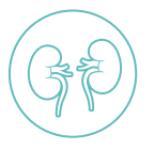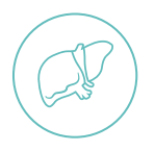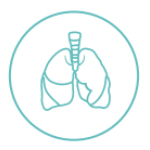Clinical Picture: Organ Failure and Sepsis
Information from ADVITOS for Patients and Relatives
The patient information from ADVITOS regarding various clinical pictures with underlying organ failure or sepsis provides an overview of the fundamental organ disorders and illustrates how the ADVOS procedure can help save lives in life-threatening situations. Multiple organ failure refers to simultaneous or successive failure of more than one organ and it constitutes a dreaded and potentially fatal complication that can arise as a result of sepsis, among other causes. Which organs or bodily functions are involved in multiple organ failure?

ADVITOS Patient Information: Malfunction or Failure of the Kidneys
The kidneys are among the most important organs in the human body. A kidney malfunction can lead to severe illness or even death.
The kidneys perform the following vital functions: They purify the blood by flushing out harmful and toxic waste products, primarily water-soluble low-molecular toxins like urea and creatinine. They keep the fluid balance, mineral balance and chemical balance in equilibrium, i.e. electrolytes such as sodium and potassium are kept within the healthy range and water levels in the body are balanced by increasing or reducing secretion of liquids. In addition, the kidneys regulate the blood’s pH level, otherwise known as acid-base homeostasis. Furthermore, they are involved in regulating blood pressure and they produce hormones.1
In Germany, around 10,000 people die each year from chronic kidney disease. Around 80,000 have to undergo chronic dialysis2 and around 2,000 donor kidneys are transplanted each year.3,4
Poor functioning of the kidneys can occur as a result of acute or chronic renal damage.
Often, damage to the kidneys is only discovered by chance, due to diagnostic findings from an unrelated examination, such as protein or microscopic traces of blood in the urine or raised levels of substances that are usually excreted in the urine identified in a blood test.
In cases of acute kidney damage, the kidney function declines rapidly, in just a few hours or days. Acute kidney damage5 is triggered in most cases by a specific event or a direct stress and it is normally reversible6. It often develops in old age, where there is a preexisting kidney functional impairment and in people with preexisting diabetes mellitus.
Around a quarter of cases of acute renal damage later develop into chronic kidney damage.6
Chronic kidney damage develops over the course of months or years.6 It involves progressive failure of the smallest functional units in the kidneys, with the result that the kidney functions are increasingly impaired over time. The most common causes are diabetic nephropathy in cases of diabetes mellitus (30–40%), arterial hypertension (approx. 20%), cardiac insufficiency or cystic kidneys7.8
Chronic renal insufficiency is also asymptomatic at first. As it progresses, impaired performance, itchiness, water retention and reduced amounts of urine, mental confusion, and vomiting and nausea can occur. The illness is not reversible, but it can be slowed down if treatment begins early, at least ensuring that the symptoms do not worsen.
If acute renal failure occurs, ADVOS multi can help by taking over the kidneys’ normal purification functions of removing water-soluble and protein-bound toxins and regulating the water balance in the body. In addition, ADVOS multi can step in to normalise the patient’s pH levels and thus stabilise the patient’s acid-base homeostasis.

ADVITOS Patient Information: Liver Illness and Liver Failure
Liver illnesses are one of the biggest health problems around the world. They affect 0.3–0.5% of the total population in developed countries. In Germany, more than five million people are affected by acute or chronic liver disease and the associated health implications. Around 90,000 patients are treated in hospitals each year for liver disease9 and in 2022, about 750 liver transplants were carried out.4
The liver performs many key functions in the human body, such as composing and decomposing fats, carbohydrates and proteins – for example, proteins for blood clotting or proteins for transporting medications and toxins in the blood.
As a detoxification and digestive organ, the liver produces the bile that is later concentrated in the gall bladder to form the bile needed to digest fats.10 Furthermore, it converts red haemoglobin into bilirubin, which is excreted through the liver.
As a key excretory organ, the liver breaks down substances such as alcohol and medications, and it removes from the blood non-water-soluble toxins or toxins that are not freely dissolved in the blood, which are generally bound to the transport protein human serum albumin.
Liver failure is divided into three different categories: acute liver failure, chronic liver failure or chronic liver insufficiency, and acute-to-chronic liver failure.
Acute liver failure is a rare event. It is marked by rapidly deteriorating liver function, with restricted blood clotting, raised liver values in blood tests and changes in perception. It is caused by spontaneous intoxication, for example due to drugs such as paracetamol or the poisonous green death cap mushroom. It can also affect pregnant persons and people with autoimmune diseases.11
Mortality in cases of acute liver failure is very high if left untreated. The illness needs to be treated in an intensive care unit. Patients can recover spontaneously with intensive therapy, but most will survive only with a liver transplant.
There is no precise data available for the frequency of acute liver failure, but a European register indicates that only 8% of all transplants are performed due to acute liver failure, of which around 20% were due to viral hepatitis, 20% after drug-induced liver failure and 5% after intoxication.11
The illness often goes unnoticed to start with, while later blood clotting is restricted, the skin turns yellow (jaundice) and water is retained in the abdomen (ascites). This often leads to bleeding in the gastrointestinal tract.
In the context of an acute event, the liver function can worsen rapidly if there is a preexisting chronic liver insufficiency. This is referred to as decompensation or, if another organ fails, acute-to-chronic liver failure. This latter case involves a high mortality rate. It is triggered by sepsis, active consumption of alcohol or a resurgence of acute viral hepatitis. A pronounced inflammatory response plays an important role. Symptoms include abdominal fluid (ascites), bleeding in the gastrointestinal tract, kidney failure, lung failure and low blood pressure experienced as circulatory shock.12
In patients with acute or acute-to-chronic liver failure, ADVOS multi helps by efficiently removing protein-bound proteins and normalising the composition of the blood. This makes it possible to tide over the time until the liver function recovers, e.g. after acute poisoning or in the context of an infection, and in the best case, a transplant can be avoided. In other cases, it can be used to bridge the gap before a liver transplant.

ADVITOS Patient Information: Lungs and Acid-Base Homeostasis
Lung disease involves illnesses that affect the respiratory tract, the alveoli, the pulmonary pleurae, the costal pleura or the blood vessels in the lungs.13
The tasks of the lungs are to enrich the blood with oxygen and to regulate acid-base homeostasis by means of the concentration of carbon dioxide. Gas exchange takes place in the alveoli. Here, oxygen (O2) is absorbed when air is breathed in and carbon dioxide (CO2) that has accumulated in the body is released on breathing out.
Lung diseases are also divided into acute and chronic cases. Acute diseases include pneumonia, for example, or acute lung failure (ARDS). Typical examples of chronic lung disease include asthma, COPD, pulmonary emphysema and pulmonary fibrosis.13
Common symptoms of lung disease include coughing14, difficulty breathing15 or shortage of breath, a whistling sound when breathing, or weakness.13
In cases of acute lung failure, such as can occur in the context of pneumonia, absorption of oxygen and the discharge of carbon dioxide are heavily restricted. The function of the lungs is supported by administering oxygen and by means of artificial respiration, but dangerous levels of carbon dioxide can accumulate despite this.16
Carbon dioxide acts as an acid in the human body, and so the blood acidifies. If the body reaches a point where it can no longer compensate for this, the pH value in the blood drops (acidosis) to life-threatening levels.16
In patients suffering from lung failure, ADVOS multi can remove around 25% of the carbon dioxide that accrues (extracorporeal fluid-based CO2 removal), thus making it easier to breathe.
ADVITOS Patient Information: Multiple Organ Failure
Multiple organ failure is a potentially reversible pathology in which two or more organs simultaneously or successively become unable to perform their tasks in the body. This is an acute, life-threatening condition.
There are various possible causes of multiple organ failure. The most frequent causes are states of shock, such as during severe bleeding or cardiac arrest, sepsis, serious accidents (polytrauma), but also critical viral infections and toxic effects.
The moment multiple organ failure threatens or is detected, it is vital to act fast, as any delay will dramatically reduce the patient’s chances of survival.
The symptoms of multiple organ failure depend on the specific damage to the organs affected, such as the liver, lungs or kidneys. For more information, see the relevant sections.17
Conventional extracorporeal procedures generally only support the function of one or two organs. The ADVOS procedure’s innovative approach, by contrast, treats multiple organ failure by combining support for all three main excretory organs.
ADVITOS Patient Information: Life-threatening Infection or Sepsis
Sepsis is commonly referred to as “blood poisoning” or septicaemia. It is a potentially fatal illness that results in severe restriction of organ functions.
Sepsis is the most common cause of death resulting from infections, affecting millions of patients, more than 25% of whom still die. Every year, around 150,000 people develop sepsis in Germany alone, with about 60,000 of them dying from it. The most frequent reason for dying is that the illness is not detected soon enough.
Sepsis occurs when the body’s own defences are no longer properly regulated and, as a result, the body’s own tissue is also damaged by an inflammatory response. The spread of infectious pathogens through the lymph and vascular system causes the immune system to flood the body with chemical messengers as an immune response. As a result, the immune system not only attacks the pathogens, it also primarily attacks cells in the body and vital organs.18
Sepsis develops most frequently from infections in the lungs, abdomen or urinary passages. Bacteria, viruses and fungi can trigger this, as can a severe COVID-19 infection.18
The symptoms are generally non-specific and often hard to distinguish from other illnesses. Fever, shivering, heart palpitation, shortness of breath, mental confusion and extreme feelings of sickness occur.
A sepsis can result in cardiovascular problems and a heavy/severe drop in blood pressure (septic shock). This can lead to multiple organ failure and often also to death. Only around half of patients survive this type of shock. Possible long-term consequences include chronic damage to all the organs affected and to the brain.18
Patients suffering from sepsis must be treated in an intensive care unit. Intensive monitoring and a variety of different drugs and equipment are available for treatment. In an intensive care unit, blood purification procedures (e.g. haemodialysis) can help rapidly remove toxins in cases of organ failure.
The ADVOS multi can help patients suffering from severe sepsis, particularly in the context of the accompanying multiple organ failure, by supporting the three main excretory organs, the liver, lungs and kidneys. As sepsis frequently also causes acidosis, ADVOS multi can help by regulating the acid-base homeostasis.
In addition, ADVOS multi can reduce the quantities of chemical messengers associated with septic shock, known as cytokines. This makes it possible to tide over the critical phase of the sepsis, for example by giving the administered antibiotics sufficient time to take effect.
